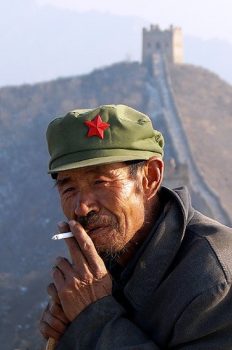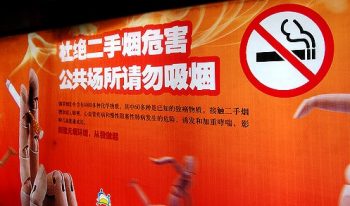Smoking in China Posted by Ayana on Jul 16, 2018 in Uncategorized
China is the largest tobacco (烟草yāncǎo) producer country in the world. Many countries around the world cultivate tobacco, but China exceeds them all: around a quarter of the tobacco fields of the world are in China.
Millions of tons of tobacco are produced every year in China alone. But more distressing is the fact that, with more than 300 million smokers (吸烟人xīyān rén), China is also the largest tobacco consumer in the world. The dreadful affect is inevitable: more than 1 million Chinese die every year from smoking-related diseases.
- 中国是世界上最大的烟草生产国和消费国。
Zhōngguó shì shìjiè shàng zuìdà de yāncǎo shēngchǎn guó hé xiāofèi guó.
China is the largest tobacco producer and consumer country in the world.
Smoking (吸烟xīyān) ban regulations already exist many Chinese cities. The Shanghai government, for example, declared a new indoor smoking ban around the city just last year. The new regulation prohibits any indoor smoking in public, on public transportation, and at work. Individuals who dare to violate this regulation will be fined between 50 Yuan to 200 Yuan. Companies are subject to a 2,000–30,000 Yuan penalty. Beijing’s regulations against public smoking, which were carried out in 2008, covers any sort of public place, for avoiding any doubt.
- 中国吸烟人数超过3亿。
Zhōngguó xīyān rénshù chāoguò 3 yì.
There are more than 300 million smokers in China.
This advertisement, for example, warns about the harms of secondhand smoking (二手烟èrshǒu yān). In a country of more than 300 million smokers, there are many, many more exposed to secondhand smoke. Unfortunately, they are not less exposed to the hazards. The figure people in the ad above run away from the smoking hand, while the title says: “No smoking (请勿吸烟 qǐng wù xīyān) in public places”.
- 每年有100多万人死于吸烟相关疾病。
Měinián yǒu 100 duō wàn rén sǐ yú xīyān xiāngguān jíbìng.
Every year, more than 1 million people die from smoking-related diseases.
Advertisements like the one above, combined with a lack of positive advertisements, attempt to to encourage people to quit smoking (戒烟 jièyān). According to the Law of the People’s Republic of China on Tobacco Monopoly, advertisements of tobacco products are not allowed on radio, television, newspapers and magazines. Although tobacco advertising is limited, in the last decade, posters of cigarettes were published around China in a guise of patriotism. 中华 (zhōnghuá) is another name for China, and it is also the name of a high-grade Chinese cigarette. The famous brand comes in a red package with an image of Tiananmen, and the brand name displays above it. Several years ago, red advertisements with an image of Tiananmen and the expression: 爱我中华(ài wǒ zhōnghuá), “love my China”, appeared around China. Although the Shanghai Tobacco Group’s logo and name were present on the ads, the company insists this is not a marketing advertisement, but a public service advertisement promoting patriotism.
The Law of the People’s Republic of China on Tobacco Monopoly also declares that cigarette packages in China must be marked with warning messages. I did see such warning on the package of the premium 中华 cigarette: 抽烟有害健康,戒烟可减少对健康的危害。 (Chōuyān yǒuhài jiànkāng jièyān kě jiǎnshǎo duì jiànkāng de wéihài). Which means: smoking is harmful to your health, quit smoking can reduce health risks.
Although the law is weakly enforced, newspapers report a drop in the number of smokers in the last couple of years. But China has still failed to curb the ingrained habit of smoking. As the Chinese National Health Board announces, Chinese tobacco is a significant source of health risks. But it’s also a significant source of revenue for municipal and national governing entities. 玉溪 (Yùxī) is a prefecture-level city in Yunnan province, located approximately 90 kilometers south of Kunming. The city is a home of the Hongta Group, one of the largest Chinese tobacco manufacturers, and as such ranks high among advantageous Chinese prefecture-level cities. Over the past decades, the city industrial revenue grew to billions of Yuan, making it one of the richest cities in the province. Watch this guy exploring Yuxi eats, beats and cigarettes:
The Ministry of Health in China has already recognized the importance of tobacco control. But tobacco has been a very profitable product for Chinese people, too. Tobacco cultivation is a major income source for many farmers; tobacco producing is a lucrative income for cities like Yuxi; and for the Chinese government as well. Tobacco generates billions of Yuan in tax and profit for the government every year. Given such an important role in government revenue, tobacco production has long been controlled by the government – the “Law of the People’s Republic of China on Tobacco Monopoly” passed by the government in 1991, reinforces the state monopoly on tobacco. Tobacco production is a state-run enterprise that provides substantial fiscal income for the government, and creates conflict of interest between public health concerns and economic benefit.
Text vocabulary
烟草yāncǎo = tobacco
香烟 xiāngyān = cigarette
吸烟 xīyān = smoking
吸烟人xīyān rén = smoker
抽烟 chōuyān = to smoke
二手烟 èrshǒu yān = secondhand smoking
请勿吸烟 qǐng wù xīyān = please no smoking
戒烟 jièyān = to quit smoking
危害 wéihài = to harm
好好学习天天向上

Build vocabulary, practice pronunciation, and more with Transparent Language Online. Available anytime, anywhere, on any device.







Leave a comment: